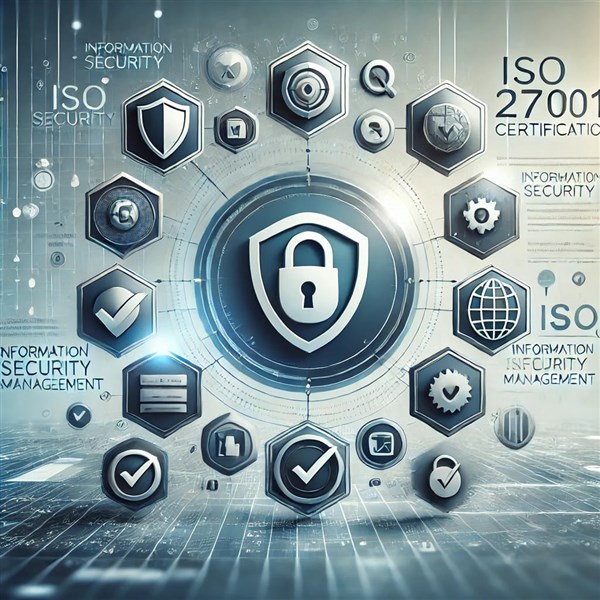
In today’s digital world, data has become the most valuable asset for businesses of all sizes. From customer information and financial records to proprietary research and intellectual property, data serves as the foundation of operations. However, with the increasing reliance on digital technologies, the risks of cyberattacks, data breaches, and regulatory fines are also on the rise. In response to these threats, businesses are adopting various security measures to safeguard their data, and one of the most recognized and trusted frameworks is ISO 27001 certification.
ISO 27001, part of the ISO/IEC 27000 family of standards, is an internationally recognized framework for managing and protecting sensitive company information. It sets out the specific requirements for establishing, implementing, maintaining, and continually improving an Information Security Management System (ISMS). This certification ensures that businesses implement a structured approach to managing sensitive data, ensuring its confidentiality, integrity, and availability.
Importance of ISO 27001 Certification
In this blog, we’ll explore why ISO 27001 certification is essential for businesses aiming to protect data, maintain high security standards, and navigate today’s complex regulatory landscape.
1. Global Recognition and Credibility
ISO 27001 is a globally accepted standard, recognized by organizations across industries. Achieving ISO 27001 certification sends a powerful message to customers, partners, and stakeholders that a business takes data security seriously. The certification enhances the organization’s credibility, as it demonstrates compliance with internationally recognized best practices for data protection. This recognition can open doors to new business opportunities and partnerships, particularly with companies that prioritize working with certified, secure organizations.
2. Comprehensive Approach to Risk Management
One of the key benefits of ISO 27001 is its focus on a risk-based approach to data security. The framework requires businesses to systematically identify potential threats and vulnerabilities and implement appropriate controls to mitigate those risks. By continuously assessing risks, companies can stay ahead of emerging threats and make informed decisions to strengthen their security posture.
The risk management process in ISO 27001 is ongoing, meaning businesses are encouraged to regularly review and update their security measures. This continuous improvement cycle ensures that security protocols evolve in response to new risks, helping companies remain resilient in the face of cyberattacks or breaches.
3. Meeting Regulatory and Compliance Requirements
With the growing number of data privacy regulations worldwide, such as the General Data Protection Regulation (GDPR), the California Consumer Privacy Act (CCPA), and others, compliance has become a critical concern for businesses. ISO 27001 provides a framework that aligns with many of these regulations, helping companies meet their legal obligations related to data protection.
Achieving ISO 27001 certification demonstrates a commitment to compliance and data privacy, which can help businesses avoid hefty fines and legal consequences associated with non-compliance. Additionally, certified organizations often find it easier to navigate audits and regulatory scrutiny, as they already have the required systems and documentation in place.
4. Enhanced Customer Trust and Business Reputation
Data breaches and security incidents can have devastating consequences for a company’s reputation. Customers expect businesses to protect their personal and financial information, and any lapse in security can lead to a loss of trust and loyalty. ISO 27001 certification provides customers with the assurance that a business has implemented robust security measures to safeguard their data.
In a competitive market, demonstrating a commitment to data security can be a significant differentiator. ISO 27001-certified businesses are often seen as more reliable and trustworthy, which can attract more customers and foster long-term relationships.
5. Improved Internal Processes and Efficiency
ISO 27001 not only strengthens security but also streamlines business processes. To achieve certification, businesses must document their security procedures, assign clear roles and responsibilities, and implement policies that promote accountability. This structured approach leads to better-organized workflows, improved communication, and a clearer understanding of security responsibilities across the organization.
By standardizing processes related to data security, businesses can reduce the likelihood of errors, oversights, or miscommunications that could lead to security vulnerabilities. Additionally, this efficiency extends to responding to incidents, as businesses are better equipped to handle potential breaches and recover more quickly.
6. Cost Savings from Reduced Security Incidents
The financial impact of a data breach can be substantial, with costs including legal fees, regulatory fines, customer compensation, and the expenses associated with recovering from the breach itself. By implementing the controls required by ISO 27001, businesses significantly reduce the likelihood of security incidents, thereby avoiding these costly repercussions.
Moreover, ISO 27001 encourages proactive rather than reactive security measures. Instead of addressing issues after they arise, businesses can take preventive actions to mitigate risks before they lead to incidents, saving time, money, and resources in the long run.
7. Continual Improvement and Adaptability
ISO 27001 emphasizes continuous improvement, which is crucial in the rapidly evolving world of cybersecurity. The framework requires businesses to regularly review their ISMS and update their security measures to adapt to new threats, technologies, and regulatory changes. This focus on continual improvement ensures that businesses remain agile and responsive in the face of evolving security challenges.
In addition to technical improvements, ISO 27001 fosters a culture of security awareness across the organization. Employees at all levels become more conscious of security risks and the role they play in protecting data. This cultural shift can significantly reduce human error, which is one of the leading causes of security breaches.
8. Business Continuity and Disaster Recovery
ISO 27001 includes provisions for business continuity planning and disaster recovery, ensuring that businesses can continue operating in the event of a security incident or other disruption. By preparing for potential risks and having a response plan in place, companies can minimize downtime and quickly recover from security incidents, protecting their reputation and financial stability.
In addition to improving security, this focus on business continuity helps organizations build resilience against other disruptions, such as natural disasters, power outages, or supply chain interruptions.
9. Competitive Advantage in the Market
In sectors where data security is a top priority—such as finance, healthcare, and government—ISO 27001 certification can be a key differentiator. Many organizations require their suppliers and partners to have ISO 27001 certification as a condition of doing business. By obtaining certification, companies position themselves as trusted, secure partners, which can give them a competitive edge in securing contracts and clients.
Conclusion
In today’s data-driven world, businesses must prioritize security to protect their most valuable asset: information. ISO 27001 certification provides a proven framework for managing and securing sensitive data, helping businesses reduce risks, comply with regulations, and build trust with customers. From enhancing internal processes and improving efficiency to gaining a competitive edge in the market, the benefits of ISO 27001 certification are clear. For businesses looking to safeguard their data and thrive in the digital economy, achieving ISO 27001 certification is not just an option—it’s a necessity.
As data security continues to be a top priority for businesses, the ISO 27001 Certification has become more important than ever. By demonstrating your commitment to protecting your information assets, you can gain a competitive edge and secure your business's future in the digital age. Start your journey towards better data security with Koenig Solutions today.







COMMENT